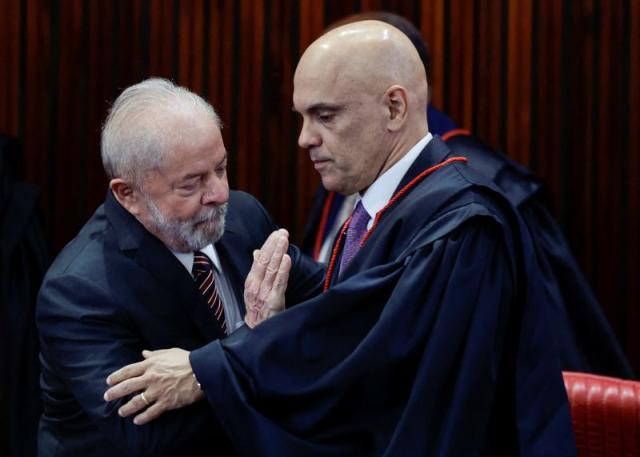The leftist ex-president takes office again Jan. 1 as the Supreme Court tries to limit Congress’s power.
By Mary Anastasia O’Grady
Brazil’s President-elect Luiz Inácio “Lula” da Silva takes office Jan. 1, launching his third (nonconsecutive) four-year term. As a self-described advocate of the poor, he faces the challenge of low growth forecasts for the next two years and inflationary pressure caused by too much government spending.
Yet even before inauguration day, Mr. da Silva—a co-founder with the late Fidel Castro of the hard-left São Paulo Forum—is telegraphing his intention to let public expenditures rip, halt privatization and reverse reforms designed to check corruption. Moderates who backed his candidacy, like former central bank president and fiscal hawk Arminio Fraga, seem surprised. In an interview with Globo News in November Mr. Fraga said: “I don’t regret my vote, but I’m concerned.”
Join the crowd.
Unfortunately, a populist Workers’ Party president promising to spend his way to national prosperity isn’t the only thing for Brazilians to fear. A greater threat is the 11-member Supreme Court, which is overstepping its jurisdiction and flouting the rule of law for political reasons without consequences.
It’s one thing for a coequal branch of government to guard its own prerogatives jealously. But when the highest court becomes an ally of ideological and corrupt politicians, democracy is in grave danger. Brazil has arrived at such a moment.
In an Oct. 30 runoff Mr. da Silva received 50.9% of the vote to 49.1% for President Jair Bolsonaro, who was seeking a second term. Mr. Bolsonaro never gave a concession speech but has instructed his government to begin the transition process in Brasília. It’s going smoothly.
Some on the losing side haven’t accepted defeat gracefully, claiming instead that the vote count was rigged. There have been peaceful protest marches in large cities. A smaller number of Lula opponents have destroyed property and clashed with the police and military in an attempt to disrupt the transfer of power.
But Brazilians widely reject the violence, and the leadership on the right recognizes Mr. da Silva as the legal winner of the election. The armed forces remain firmly on the side of the constitution.
That said, the matter of the politicized high court remains an open wound for a public that is fast losing trust in its institutions.
The 2019 Brazilian Supreme Court ruling—by a narrow majority—to release Mr. da Silva from prison shocked the nation. The public had cheered prosecutors who convicted him in 2017 on corruption charges and who unraveled a wider multimillion-dollar kickback scheme orchestrated by his Workers’ Party. The enormous scandal involved business, congressmen on both sides of the aisle, the state-owned oil company, the national development bank and many foreign governments.
The evidence against Lula was solid and his conviction had been confirmed by two appeals courts. But the high court reversed its own precedents and annulled the decision. It knew that the statute of limitations didn’t leave time for a retrial. Lula was released but never exonerated.
The judicial activism didn’t stop there. During the most recent campaign, the country’s electoral tribunal—which included three high-court justices—censored Lula’s critics, including a former Supreme Court justice, who pointed out that the candidate was freed on a technicality but not cleared.

The same tribunal also censored other political speech from business leaders, elected members of Congress and news-and-entertainment platforms on the right. This has been carried out with assistance from the electoral tribunal’s “special advisory to combat disinformation.” It acts as a ministry of truth.
Some Brazilian democrats are sanguine about the new Lula government because his Workers’ Party won’t control Congress, which is in charge of the budget. Yet one Supreme Court justice has already asserted that Congress lacks the power to use a cap to deny increases in certain welfare spending that Lula wants. This is preposterous—as in the U.S., the Brazilian Constitution gives lawmakers the power of the purse. But last week Congress bowed to the pressure and removed the cap.
Lula is a clever politician and will want to reconstitute a multiparty network of lawmakers who will let him do as he pleases as long as he deals them in. All indications point to a Supreme Court that is ready to help by using its power, including the threat of criminal prosecution, to pressure legislators who hesitate to cooperate.
Mr. Fraga’s worries are on the fiscal front. “I see old ideas that have never worked for us,” he told Bloomberg Línea in an interview in Rio de Janeiro published last week. “We are about to see massive fiscal expansion in an economy that is no longer in crisis.” New stimulus that could spike the primary budget deficit to 2% “makes no sense,” Mr. Fraga said.
Eventually Lula will run out of other people’s money. But that can hardly be a comfort to aspiring Brazilians.
Fonte:

